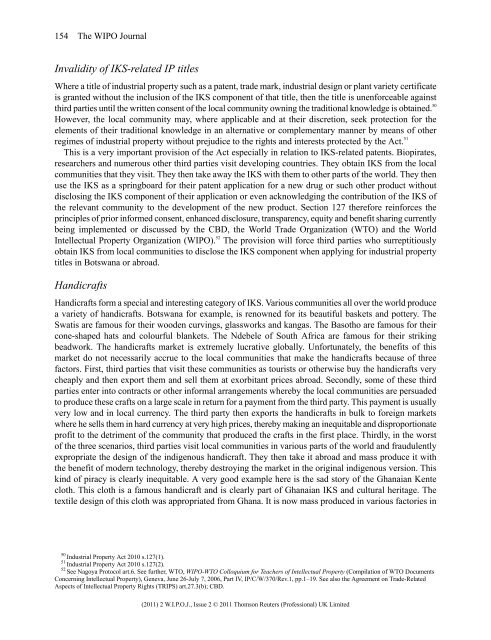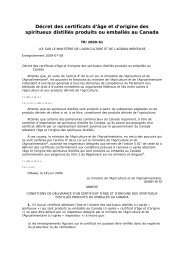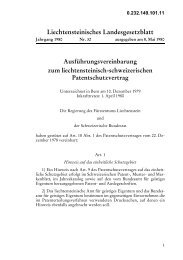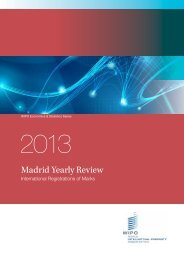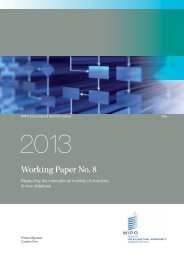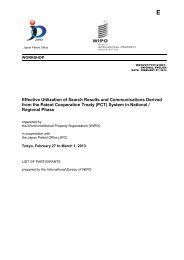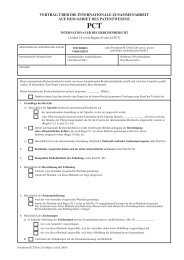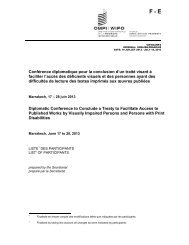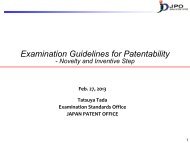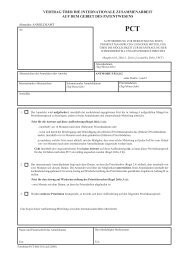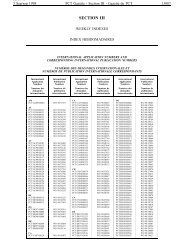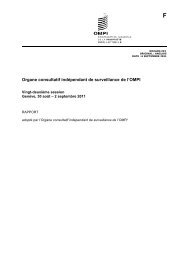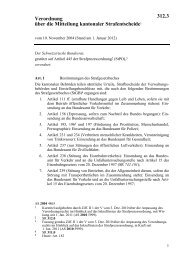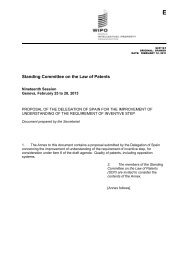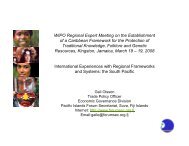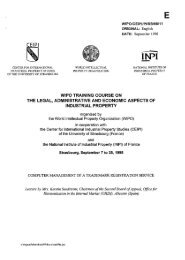WIPO Journal - World Intellectual Property Organization
WIPO Journal - World Intellectual Property Organization
WIPO Journal - World Intellectual Property Organization
Create successful ePaper yourself
Turn your PDF publications into a flip-book with our unique Google optimized e-Paper software.
154 The <strong>WIPO</strong> <strong>Journal</strong><br />
Invalidity of IKS-related IP titles<br />
Where a title of industrial property such as a patent, trade mark, industrial design or plant variety certificate<br />
is granted without the inclusion of the IKS component of that title, then the title is unenforceable against<br />
third parties until the written consent of the local community owning the traditional knowledge is obtained. 50<br />
However, the local community may, where applicable and at their discretion, seek protection for the<br />
elements of their traditional knowledge in an alternative or complementary manner by means of other<br />
regimes of industrial property without prejudice to the rights and interests protected by the Act. 51<br />
This is a very important provision of the Act especially in relation to IKS-related patents. Biopirates,<br />
researchers and numerous other third parties visit developing countries. They obtain IKS from the local<br />
communities that they visit. They then take away the IKS with them to other parts of the world. They then<br />
use the IKS as a springboard for their patent application for a new drug or such other product without<br />
disclosing the IKS component of their application or even acknowledging the contribution of the IKS of<br />
the relevant community to the development of the new product. Section 127 therefore reinforces the<br />
principles of prior informed consent, enhanced disclosure, transparency, equity and benefit sharing currently<br />
being implemented or discussed by the CBD, the <strong>World</strong> Trade <strong>Organization</strong> (WTO) and the <strong>World</strong><br />
<strong>Intellectual</strong> <strong>Property</strong> <strong>Organization</strong> (<strong>WIPO</strong>). 52 The provision will force third parties who surreptitiously<br />
obtain IKS from local communities to disclose the IKS component when applying for industrial property<br />
titles in Botswana or abroad.<br />
Handicrafts<br />
Handicrafts form a special and interesting category of IKS. Various communities all over the world produce<br />
a variety of handicrafts. Botswana for example, is renowned for its beautiful baskets and pottery. The<br />
Swatis are famous for their wooden curvings, glassworks and kangas. The Basotho are famous for their<br />
cone-shaped hats and colourful blankets. The Ndebele of South Africa are famous for their striking<br />
beadwork. The handicrafts market is extremely lucrative globally. Unfortunately, the benefits of this<br />
market do not necessarily accrue to the local communities that make the handicrafts because of three<br />
factors. First, third parties that visit these communities as tourists or otherwise buy the handicrafts very<br />
cheaply and then export them and sell them at exorbitant prices abroad. Secondly, some of these third<br />
parties enter into contracts or other informal arrangements whereby the local communities are persuaded<br />
to produce these crafts on a large scale in return for a payment from the third party. This payment is usually<br />
very low and in local currency. The third party then exports the handicrafts in bulk to foreign markets<br />
where he sells them in hard currency at very high prices, thereby making an inequitable and disproportionate<br />
profit to the detriment of the community that produced the crafts in the first place. Thirdly, in the worst<br />
of the three scenarios, third parties visit local communities in various parts of the world and fraudulently<br />
expropriate the design of the indigenous handicraft. They then take it abroad and mass produce it with<br />
the benefit of modern technology, thereby destroying the market in the original indigenous version. This<br />
kind of piracy is clearly inequitable. A very good example here is the sad story of the Ghanaian Kente<br />
cloth. This cloth is a famous handicraft and is clearly part of Ghanaian IKS and cultural heritage. The<br />
textile design of this cloth was appropriated from Ghana. It is now mass produced in various factories in<br />
50 Industrial <strong>Property</strong> Act 2010 s.127(1).<br />
51 Industrial <strong>Property</strong> Act 2010 s.127(2).<br />
52 See Nagoya Protocol art.6. See further, WTO, <strong>WIPO</strong>-WTO Colloquium for Teachers of <strong>Intellectual</strong> <strong>Property</strong> (Compilation of WTO Documents<br />
Concerning <strong>Intellectual</strong> <strong>Property</strong>), Geneva, June 26-July 7, 2006, Part IV, IP/C/W/370/Rev.1, pp.1–19. See also the Agreement on Trade-Related<br />
Aspects of <strong>Intellectual</strong> <strong>Property</strong> Rights (TRIPS) art.27.3(b); CBD.<br />
(2011) 2 W.I.P.O.J., Issue 2 © 2011 Thomson Reuters (Professional) UK Limited


